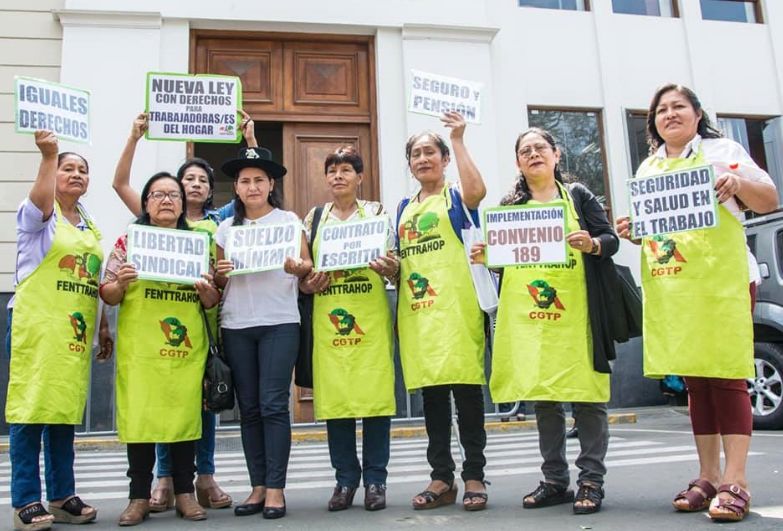Disclaimer: This article is more than 4 years old, and may not include the most up-to-date information or statistics. Please verify information with more recent sources as needed, and if you have any questions contact our Press Office.
As the Domestic Work Convention entered into force last week, this case in Peru highlights the struggle for domestic workers to get the respect they deserve. By Chris O’Connell

5 December 2019
When we go to work, we expect to be treated with respect, be paid on time, have time off and plenty of other rights we probably take for granted. For domestic workers – cleaners, cooks, nannies, carers – it’s not that simple. Peru’s example shows that there’s still a long way to go to have the respect and rights that domestic workers deserve.
Around the world, many of the estimated 67.1 million people (mostly women and girls) working in private homes experience disrespect, discrimination, abuse and exploitation as part of their working lives. Domestic labour is not formally treated as work by many countries, meaning that workers lack rights and protections, including holidays, time off, and minimum pay. Working behind closed doors in private homes, they often suffer physical, sexual and psychological abuse. Often these exploitative practices amount to slavery.
This is why Anti-Slavery International, together with workers’ movements, campaigned for a new international law protecting domestic workers. The ‘Home Alone’ campaign contributed to the International Labour Organization adopting the Domestic Work Convention 189 in 2011, a “ground-breaking treaty” that recognised domestic labour as work and provided rights and protections.
The adoption of the Convention didn’t solve all problems at once, of course. Disappointingly, to date, only 29 countries have ratified it and the implementation is far from perfect. As an example, the UK not only has not ratified the Convention, it was one of just eight countries that failed to vote in favour of the convention in the first place.
Peru, which just marked a year since the Convention’s ratification, is a good example of a country where, despite ratification, attempts to reform national laws have so far failed. This case typifies the hurdles facing domestic workers across the world.
After a huge economic crisis and bloody armed conflict in the 1980s, a decade of authoritarian rule under President Alberto Fujimori saw labour standards decimated, deepening the “enslavement and violation of the human rights of domestic workers”, according to union SINTTRAHOL.
Domestic workers began re-organising following the 2003 Law that guaranteed domestic workers roughly half the rights and protections of other workers, de facto legalising their second-class status. This law confines Peru’s domestic workers to the shadows, while their labour facilitates others to enter the ‘official’ workforce.
In their long road to the ratification of the Domestic Work Convention, the movement encountered many obstacles, according to Sofia Mauricio, a former domestic worker and director of Anti-Slavery’s partner, Asociación Grupo de Trabajo Redes (AGTR). Among these is a social acceptance of domestic work, opposition from the powerful business sector, political apathy and instability.
AGTR addresses some these through a weekly radio show ‘No Somos Invisibles’ (We Are Not Invisible), attracting over 30,000 listeners. But the eventual ratification of C189 owes much to the persistence and creativity of domestic workers movements and their allies. They spent years organising petitions, lobbying legislators and ministers, producing draft laws, and famously marching in aprons to the Congress.
This success also owes a lot to good fortune: when President Kuczynski resigned in early 2018, his replacement Martin Vizcarra sought to improve his image by putting C189 to a vote. According to Ms Mauricio, the timing of the vote in June 2018 was fortuitous: Peru’s national soccer team was participating in the World Cup for the first time since 1982, meaning that many deputies were absent. The vote passed Congress and Peru formally ratified C189 on 26 November, 2018.
The Convention allows a year to reform its laws before it enters into force. Although that time limit expired last week, little progress has been made due to a mix of obstruction, apathy and instability, as well as a renewed opposition from business. Domestic workers and their allies proposed draft laws but received little support from the Labour Ministry.
This sense of ‘two steps forward, one step back’ is encapsulated by recent events, where a draft law was finally approved by the Women and Family Commission in May, only for president Vizcarra to dissolve Congress in September and call new elections. Ms Mauricio fears that workers will have to “start again from scratch”.
Domestic workers are uniquely vulnerable to abuse and exploitation. The need for support for them and advocacy to address structural issues behind it, such as Anti-Slavery International’s work in Tanzania, is clear. Nevertheless, as the case of Peru reveals, even when faced by significant obstacles, domestic workers will continue to campaign for the recognition of their rights. All workers deserve respect in their workplaces, even if these happen to be private homes.
Chris O’Connell is a post-doctoral researcher seconded to Anti-Slavery International. This research has received funding from the Irish Research Council and from the European Union’s Horizon 2020 research and innovation programme under the Marie Sklodowska-Curie grant agreement No. 713279.





